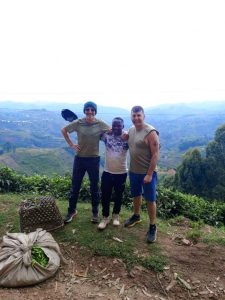Reasons to hire a tour guide for the next Uganda safari
Reasons to hire a tour guide for the next Uganda safari, Hiring a tour guide for your Uganda safari can enhance your experience in numerous ways, providing you with valuable insights, ensuring safety, and maximising your enjoyment of the journey. Here are several reasons why you might consider hiring a tour guide for your next Uganda safari:
Local Knowledge # Reasons to hire a tour guide for the next Uganda safari
Tour guides possess in-depth knowledge of the local geography, wildlife, flora, and fauna. They can share valuable insights about the natural and cultural aspects of Uganda, providing a richer and more educational experience.
Wildlife Spotting Expertise #Reasons to hire a tour guide for the next Uganda safari
Experienced guides have a keen eye for wildlife spotting. They are trained to identify animal tracks, sounds, and movement, increasing the chances of encountering diverse species in their natural habitats.
 Cultural Understanding:
Cultural Understanding:
Tour guides can bridge the cultural gap, offering explanations and interpretations of local customs, traditions, and practices. This helps you gain a deeper understanding of the communities you encounter during your safari.
Optimal Itinerary Planning:
Tour guides can create well-planned itineraries that maximize your time and ensure you visit the most captivating locations. They understand the optimal times for wildlife sightings and can adjust schedules based on seasonal variations.
Safety and Security:
Guides are trained in safety protocols and have knowledge of potential risks in the areas you’ll be visiting. They can navigate through the terrain safely, making your safari experience secure and enjoyable.
Interaction with Local Communities:
Tour guides can facilitate meaningful interactions with local communities, allowing you to engage with residents, learn about their way of life, and possibly participate in cultural activities.
Access to Restricted Areas:
In certain national parks or wildlife reserves, access to specific areas may be restricted. A licensed tour guide often has the necessary permissions to take you to these restricted zones, providing a more exclusive and immersive experience.
Environmental Awareness:
Guides emphasise responsible and sustainable tourism practices. They can educate you on how to minimize your impact on the environment and wildlife, promoting ethical and eco-friendly safari experiences.
Language Assistance:
If English is not your first language, a local guide can assist with language barriers, ensuring effective communication with locals and enhancing your overall experience.
Logistical Support:
Guides handle logistics such as transportation, accommodations, and permits, allowing you to focus on enjoying the safari. They can troubleshoot any unexpected issues that may arise during the journey.
Photography Guidance:
Guides often have knowledge of photography and can help you capture memorable moments. They understand the behavior of animals, optimal lighting conditions, and the best angles for photography.
Customised Experiences:
A guide can tailor the safari experience to your interests and preferences. Whether you’re interested in birdwatching, tracking specific wildlife, or focusing on photography, a guide can customize the itinerary to meet your desires.
Efficient Navigation:
Navigating through national parks or wilderness areas can be challenging. A guide knows the terrain, ensuring you don’t get lost and helping you make the most of your time in the wilderness.
Peace of Mind:
Having a knowledgeable guide provides peace of mind. You can relax and enjoy the experience, knowing that you’re in capable hands with someone who understands the local environment.
Insider Tips and Recommendations:
A local guide can provide insider tips and recommendations on the best viewpoints, hidden gems, and lesser-known attractions, ensuring you make the most of your safari experience.
Educational Narratives:
Guides often share captivating stories and facts about the wildlife, ecosystems, and historical significance of the areas you’re exploring. This adds depth and context to your safari, turning it into a learning adventure.
First-Aid and Emergency Response:
Trained guides equipped to handle medical emergencies and first-aid situations. Their knowledge and preparedness contribute to a safer safari experience, especially in remote or wild areas.
Seamless Communication with Locals:
A local guide can facilitate communication with local communities, ensuring that you can interact with residents, ask questions, and participate in activities without language barriers.
Real-time Adaptation to Wildlife Movements:
Wildlife can be unpredictable, and animals may move to different areas throughout the day. Guides have the ability to adapt the itinerary in real-time based on recent wildlife sightings, increasing the chances of encountering specific species.
Birdwatching Expertise:
Uganda is a paradise for birdwatchers, with a diverse range of bird species. A knowledgeable guide can help identify various birds, their calls, and habitats, enhancing the birdwatching aspect of your safari.
Cultural Etiquette Guidance:
Guides can provide insights into local customs and cultural etiquette, ensuring that you approach interactions respectfully and avoid unintentional cultural misunderstandings.
Equipment and Gear Assistance:
Guides assist with handling and setting up equipment, such as binoculars or camera gear, ensuring you are well-prepared for wildlife observation and photography.
Interpretation of Animal Behavior:
Understanding animal behavior is crucial for a successful safari. Guides can interpret the behavior of wildlife, predicting movements and allowing you to observe animals in their natural habitats more effectively.
Group Coordination:
If you’re traveling in a group, a guide can efficiently coordinate activities, manage logistics, and ensure that everyone in the group has a fulfilling and enjoyable experience.
Time Efficiency:
Guides are familiar with the optimal times for wildlife activities and can plan your safari to maximize your chances of seeing specific animals during their most active periods.
Multilingual Skills:
Some guides may be fluent in multiple languages, catering to the diverse backgrounds of travellers. This can enhance communication and make your safari more accessible and enjoyable.
Local Events and Festivals:
Guides can inform you about any local events or festivals taking place during your visit, allowing you to experience the cultural vibrancy of Uganda beyond the wildlife attractions.
When choosing a tour guide, ensure they are licensed, experienced, and knowledgeable about the specific regions you plan to visit in Uganda. Reading reviews, seeking recommendations, and communicating your preferences with the guide beforehand can help ensure a memorable and enjoyable safari experience.
